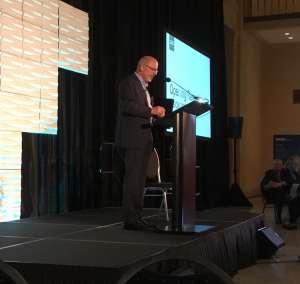Data Privacy and the CCPA
At the 2019 WCIRB Annual Meeting, a session discussed data privacy concerns under the strong data privacy laws in California. The speakers were: Jeremy Merz – American Property Casualty Insurance Association Nicholas Roxborough – Roxborough Pomerance Nye & Adreani Mark Webb – Prop 23 Advisors The 2018 California Consumer Privacy Act (CCPA) takes effect in January 2020. This will significantly impact any company that does business in California. It is the most extensive Consumer Privacy legislation in the United States. For insurance companies this creates significant risks. In particular, carriers need to be reviewing how they are collecting and using
(Read the full article…)
Opening Keynote at WCIRB Annual Conference
At the 2019 WCIRB Annual Conference, California Insurance Commissioner Ricardo Lara talked about the many challenges they are trying to address at their department. Among his comments: The biggest concern right now is the impact of wildfires on California residents. How do we continue to provide affordable and accessible property insurance to everyone when the private insurance marketplace is pulling back in some areas due to high risk. Mitigation of the risk is key which includes addressing issues such as the types of building materials, the infrastructure, and land management. Right now the State is essentially self-insuring this risk and
(Read the full article…)
Opening Remarks from WCIRB CEO Bill Mudge
At the WCIRB Annual Meeting, President and CEO Bill Mudge talked about the history of California Workers’ Compensation and the concerns for the future. The session started with a review of the history of California workers’ compensation. Due to a combination of unintended consequences of legislation and case law, carrier combined ratios skyrocket during the late 1990s, eventually reaching over 180% in 2000. The biggest culprit in this was the “presumption of correctness by treating physician” which had the unintended consequence of causing medical costs on claims to increase rapidly as unscrupulous physicians were virtually unlimited in what they could
(Read the full article…)
State of the California System
At the 2019 WCIRB Annual Conference, Dave Bellusci, WCIRB Executive Vice President and Chief Actuary talked about the status of the California workers’ compensation system. Some key talking points were: Total premiums in California have dropped since 2017 after 7 straight years of increase. There are $15.7 billion in premiums forecast for 2019. Employer payroll growth has been offset by declining premium rates which has resulted in the overall premium declines. The top 10 carriers currently write around 50% of the marketplace. This is the least concentrated the market has been in years. National carriers write the bulk of the
(Read the full article…)
Addressing Municipalities’ Biggest Workers’ Compensation Challenges
Mark Walls (Vice President – Communications & Strategic Analysis, Safety National) and Kimberly George (Senior Vice President – Corporate Development/M&A/Healthcare, Sedgwick) were joined by the following panel of public risk managers at the 2019 PRIMA Annual Conference to discuss trending topics and challenges in industry workers’ compensation. Jonathan Hall (Executive Director, Garden State Municipal Joint Insurance Fund) Anne-Marie Sharpe (Director – Risk Management, City of Miami) Dawn Watkins (Director – Integrated Disability Management, Los Angeles Unified Public School District) Presumption Laws Anne-Marie shared that in her organization, employment physicals can be critical to manage presumption related cases. Jonathan talked through
(Read the full article…)
Law Enforcement, Risk Managment & Civilian Responsibility for De-escalation
Ariel Jenkins (Director – Risk Control, Safety National), Randy Jacoby (Senior Risk Management Consultant, Midlands), and Dax Salmon (Litigation Case Manager, OSS Law Enforcement Advisors) presented this session on confronting the reality of police-resident contacts, clarifying responsibility, and highlighting best practices regarding safety and risk management for all involved at the 2019 PRIMA Annual Conference. There is a long list of stakeholders in these seemingly small interactions which elevates the visibility and ultimately impact to communities and the national conversation on this topic. Ariel shared that as law-abiding citizens, we have an obligation to make sure law enforcement does not
(Read the full article…)
A Company’s Journey to Implementing ERM
This session presented by James Curbeam, CPCU, ARM, AIC (Risk Manager, Las Vegas Valley Water District) and Lisa Kremer (Strategic Risk Practice Leader, Marsh Risk Consulting) at the 2019 PRIMA Annual Conference discussed transitioning from a traditional risk management program to an enterprise approach when evaluating the risks of an organization. Lisa began this session explaining what ERM is. The goal of an enterprise-wide risk management initiative is to create, project, and enhance stakeholders value by managing the uncertainties that could influence achieving the organization’s objectives. Lisa encouraged the approach of building upon the traditional risk management program into a
(Read the full article…)
Workers’ Compensation and “Medicare for All”
At the 2019 NCSI Annual Meeting, Doug Holmes from Strategic Services on Unemployment & Workers’ Compensation (UWC) talked about how workers’ compensation factors into the “Medicare for All” push. Is “Medicare for All” a serious possibility? It does poll well with the public and it is a focus of the Democratic Party including all of their Presidential candidates. So yes, this is an issue that needs to be taken seriously. There are two “Medicare for All” bills in Congress right now. S 1129 was introduced in April by Bernie Sanders. The bill states that “no employee benefit plan may provide
(Read the full article…)
Managing Pain Without Opioids
At the 2019 National Council of Self Insurers Annual Meeting a panel discussed managing chronic pain without medications. The speakers were: Mark Pew – Preferred Medical Geralyn Datz, PhD. – Southern Behavioral Medicine Associates Becky Curtis – Take Courage Coaching Pain is your body’s reaction to a stimuli. One way to alter that reaction is with the use of medications that can mask the pain. However, these medications have a wide range of bad side effects and your body eventually develops a tolerance making them less effective. Mental health plays a tremendous role in pain and unfortunately this is often
(Read the full article…)
Healthcare Pricing and Workers’ Compensation
At the 2019 National Council of Self Insurers Annual Meeting, Joe Paduda from Health Strategy Associates discussed how changes in the healthcare marketplace are impacting the price of medical services in workers’ compensation Over half of all medical costs for workers’ compensation go to facilities. This includes hospital inpatient and outpatient services, and physician charges from facilities. The total workers’ compensation medical spend in the United States is less than 1% of the total healthcare spend. This means that workers’ compensation has very little influence on the drivers in the healthcare system. As big as we think we are, we
(Read the full article…)








